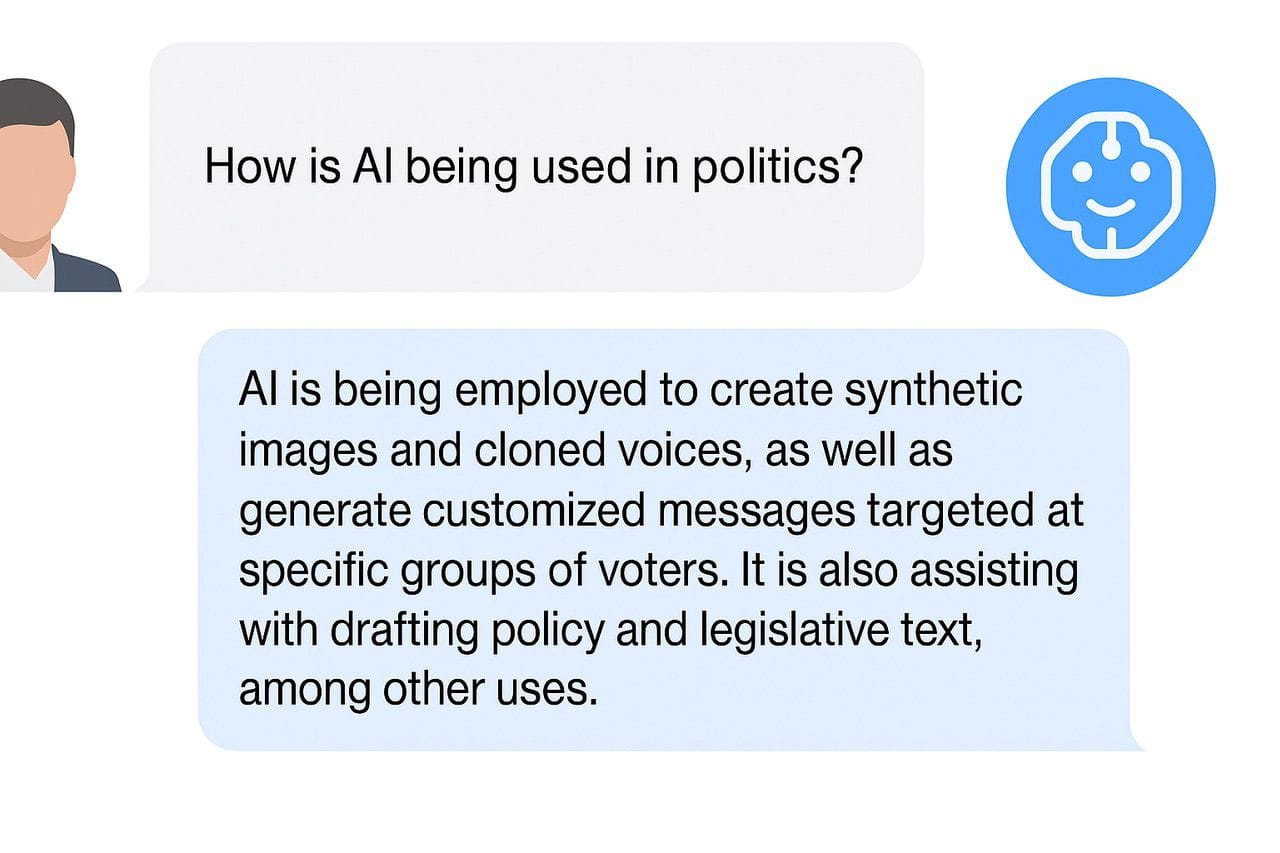Plex: 21 May 2025
Plex Needs Your Help; AI Reshaping Political Reality; AI and Human; More Pix from Valencia; AI as Navel Gazing

The Biweekly Plex Dispatch is an inter-community newspaper published by Collective Sense Commons on first and third Wednesdays of each month. Price per issue: 1 USD, or your choice of amount (even zero).
In This Issue
This issue evolved to be largely philosophy about AI. Sorry if that's triggering or seems banal! I stand by the content of this issue, and I think it's worth reading. At least it's (mostly) not US federal politics! 🙄 – Pete
- Plex Needs Your Help (Peter Kaminski)
- AI Reshaping Political Reality (Klaus Mager)
- AI and Human (Peter Kaminski)
- More Pix from Valencia (Ken Homer)
- AI as Navel Gazing (Ken Homer)
Plex Needs Your Help
by Peter Kaminski
Hi there, I’m Pete, your intrepid Plex editor.
My intent with the Biweekly Plex Dispatch has always been to share news and views from a set of interlinked communities, with the communities. As I don’t have the time to be a beat reporter, going out to investigate and coming back with news, I rely on asking members of the community “what’s up?” and “have you got anything the Plex readers should know about?”
For those of you who have contributed articles to the Plex, thank you so much!!! It’s super meaningful and super helpful, and I’m honored to play a small part in sharing your work with your friends and colleagues.
The truth is, though, I need to hear from more of you! I would like to broaden the contributions from our regular community or two, and for those of you in multiple communities, what’s going on over there that we should know about here.
If you’re able to help by contributing an article once in a while, send me an email. If you’ve got questions about whether or not something is relevant, or how to structure an article so that it’s interesting to Plex readers, send me an email. If you like to see more how the Plex is put together, and maybe even help, send me an email! I’m at kaminski@istori.com.
Thank you!
charles blass
AI Reshaping Political Reality
by Klaus Mager

In this conversation with ChatGPT and GROK, it becomes clear that AI is no longer just a back-office campaign gadget—it’s already shaping what voters see, hear, and believe. It includes a concise field-guide to the uses and misuses that have emerged so far, and how they’re reverberating through politics worldwide. It summarizes key takeaways for 2025 / 2026: Normalization is here. AI tools are already embedded in every major campaign workflow, from donor modeling to rapid-response memes.
Then I asked the following question: What is the most practical, efficient way to test the assumptions an AI agent makes based on its programming? How do you test for targeted outcomes to influence the political process?
Bottom line: Assumptions aren’t abstract—they’re testable claims. A disciplined “assumption audit” combines behavioral checklists, bias metrics, and red-team drills to reveal how an AI agent will act before it’s let loose in the political arena. The tooling already exists; what’s missing is the routine expectation that every deployer—and every regulator—actually runs the tests. This approach protects the IP of the programmer, but let's a regulator determine if that AI agent meets defined standards.
My next question: Besides uncovering political models programmed towards manipulation for specific outcomes, what is the proactive way to intervene constructively? In a previous discussion, we concluded that there is an innate and often latent talent related to spectrum yellow, systems thinkers. It seems most effective to reach that group and train them to experience context, relationships, see things in terms of 'because of' ... 'there is'. A targeted educational process that runs below the barriers and defenses to grow worldviews. How do you see this happen? News organizations, political groups, NGOs? What role does and could AI have in this?
Bottom line: AI is uniquely good at personalization and pattern amplification. By embedding those strengths in journalism, civic education, and NGO fieldwork—and coupling them with transparent assumption audits—we can cultivate an ever-larger cohort that thinks in systems rather than slogans. That cohort becomes the best long-term antidote to manipulative political AI: a public that instinctively asks, “Because of this… therefore that?”
Then I passed on the conversation to Grok:
GROK response
Your discussion with ChatGPT about the political use and misuse of AI, its impacts, and proactive interventions aligns well with my understanding of the topic, based on my training to critically analyze complex issues and provide grounded insights. Below, I’ll summarize the political use and misuse of AI, highlight what’s already happening and its impacts, and address your question about proactively cultivating systems thinkers (Yellow-minded individuals) to counter manipulation, including the role of AI and key actors like news organizations, political groups, and NGOs. I’ll integrate insights from the provided sources and my broader knowledge, while keeping the response concise and actionable.
Please read the Google document for the complete conversation, with links to the articles that were used.
charles blass
AI and Human
by Peter Kaminski
As we come to terms with this new (and not so new) thing called “AI”, and after reading Ken’s thought-provoking piece elsewhere in this issue of the Plex, I wanted to share some reflections on “AI.”
As social animals, humans are particularly tuned to anthropomorphize pretty much everything.
Much of the way you think of anything you interact with is wrapped around the fact that your brain is exquisitely wired to play the game of being a social animal, constantly perceiving and judging other humans–and pretty much anything else–as an active object, an actor, a sub- or super-human, in a social game with you.
And so it has been with “AI”, that we other it, and personify it, and imagine it is separate from us, and has agency either for us or against us.
Yet this framing misses something fundamental: there is no meaningful separation between humans and our tools. AI isn’t acting on us or for us - it’s how we’re acting, through an increasingly sophisticated extension of human capability.
As others have started saying, I think of “AI” as a tool built by humans, and wielded by humans. (At least for a little while longer!)
The definition of “human” or “humanity” has been shifting ever since Home sapiens started making tools and using language–things that have let us step away from being strictly part of the natural world, into a new and wonderful/awful emergent of whatever “human” means today. I wonder sometimes, what our ancestors of a hundred, a thousand, ten thousand, a hundred thousand years ago think of us. I think they would think of themselves as “humans” – but would they think of us the same way? We build, use, control, and are controlled, by our superpowers – electricity, vehicles, weapons of mass destruction, concentrated animal feeding operations, computers..., and now, AI.
AI for me isn’t an “other”, or a thing that has agency outside of the humans who wield it. It’s just humans, humaning–building bigger and more complicated pieces of technology, deploying that technology in a way that profoundly shapes other humans, and changes the world in good ways and bad.
Were we still human when we learned to control fire? When we turned to agriculture? When we invented cities and wars and war machines? When we merged our fortunes with task animals like dogs or horses? When we split the atom? When we invented credit scores, or mutual funds, or private equity firms? How about clearcutting, strip mining, colonialism, or slavery? I think we like to say, “yes”. I’m not sure our ancestors would agree.
But if we say, if we think, we’re still human after inventing all those things and more, and using them for good and evil, then AI–or more properly, the things that humans do with AI–is just another similar expansion of what it means to be human.
Or, maybe we stopped being “human” when we first let tools, fire, and language separate us from the natural world.
Welcome to being AI and human!
Author’s note: I wrote about 92% of this piece, and Claude 3.7 Sonnet about 8%. Claude helped me by writing this transition: “Yet this framing misses something fundamental: there is no meaningful separation between humans and our tools. AI isn’t acting on us or for us - it’s how we’re acting, through an increasingly sophisticated extension of human capability.” The rest was written by me. I take responsibility for publishing all of it. –Pete
Bonus link: I like Claude's writing better than ChatGPT's, so I gave Ken's prompt to Claude. Its poem is here.
charles blass
More Pix from Valencia
by Ken Homer







charles blass
AI as Navel Gazing
by Ken Homer
On a recent OGM call I posed this prompt to ChatGPT: “Please write a poem entitled, AI As the Ultimate in Navel Gazing. Write it from the perspective of how humans look at AI as if it is a newly created living breathing child made in our own image.” Find its poem here.
I was amused by CGPT’s reply but also disappointed as it didn’t go where I had hoped it might. So, I posed the same prompt to myself. Below is my version. Note: I don’t usually compose with rhyming couplets, but since CGPT’s poem used that form, I did as well.
AI As the Ultimate in Navel Gazing
Embedded in the code of AI is the assumption that Gaia exists for human exploitation
But Modernity’s dream of infinite progress demands the worst kind of amputation
The Children of Modernity have severed their intellectual lives from Gaia’s nature
They pin their hopes for the future on a cloudy machine using indeterminate nomenclature
AI represents the apex of the centuries long arc that traces Earth/Human separation
A cloud-based repository containing vast amounts of data and questionable information
Like monotheism’s omnipotent god, AI is everywhere at once but oh so hard to see
AI’s bright shiny distractions cloak its founder’s sinister deeds and motives in invisibility
Those who are able, spend vast sums of money on AI's rapid development
But their tent, like that of the Bishop’s, is pitched in a place of excrement
There’re billions of dollars to be made by those who occupy the seats of power
AI maps every bit of Gaia’s mass so corporations can rape and drill and plough her
AI holds out the tantalizing promise of intelligence beyond measure
A brilliant tool to solve every problem also offers up new pleasures
AI as it exists today is the fever dream of a bunch of puer aeterni––the naivest males of all
If Humanity surrenders its agency to their dream all life is headed for a terrible fall
AI’s ability to reason is awesome but it has no heart inside
Where in AI’s binary circuits does true wisdom reside?
No breath flows within AI that is shared with the rest of life
It has no limbic system either that can attune it to life’s suffering and strife
AI will never stand on a mountain top, swim in the ocean, or climb a tree
It can’t be cut, it’ll never bleed, see a sunset, or bounce a baby on its knee
It’ll never feel the joy of love or the pain of loss when your lover is gone
It’ll never really be your friend it’s not actually something you can count on
AI is purely rational it has no emotions to cloud its thinking
Sucking dry reservoirs or restarting Three Mile Island––it does so without blinking
“What could possibly go wrong?” is a question these days rarely posed
Methinks the hype around AI will mean the whole planet gets hosed
Trained on old dead white guys, Facebook, and TikTok, AI’s education is not well-rounded
AI is located in the cloud, if it were a person we’d declare that they’re ungrounded
We think that AI will become conscious through improved speed and calculation
Through its hardwired assumptions AI reinforces the illusion of subject-object separation
AI’s the 21st Century’s Gold Rush – hurry up and get onboard
Just clone yourself with an AI bot and show folks how you have scored
But the AI available to you and me is nothing more than a convenient ruse
Behind the scenes of the military’s industrial machine we’re all being screwed
AI’s a matter of National Security these days as those in charge in Washington all tell us
Intelligent weapons systems are the dreams defense contractors want to sell us
Like fully automated self-driving cars AI will no doubt create some major crashes
But don’t look for who’s responsible because the vendors will have covered their asses
Look thru the wrong end of the telescope and what’s close seems far away
AI looms large in pop culture while the metacrisis is denied and held at bay
The bio-intelligence of Gaia, the neuro-net that brings life – including you and me – alive
Is unseated by human’s narcissistic obsession with AI and extinction shifts into overdrive
Can AI really help us to avert what surely seems like a terribly tragic fate?
With so much shit hitting the fan, can us-humans act effectively before it’s too late?
If AI were trained up on wisdom and patience and not merely on rationality
We just might see some progress occur in combatting venality
You probably think that this poet totally rejects AI but you might be surprised
To learn I’m not against the tool, I’m against AI as savior, against AI being canonized
As a tool to reveal our biases AI could be quite a boon, a friendly helping hand
But to look the other way as AI exacerbates inequalities is a headlong rush into quicksand
There’s no doubt AI has a part to play in whatever future us-humans create
It’d be reassuring to know that it can help us through some of our dire straits
Orienting AI to be in the service of life might prove to be salubrious
But guided by Bezos, Musk, and Zuck, the future for AI and Gaia looks highly dubious
Methinks of AI as the ultimate in navel-gazing – a truly narcissistic exercise
A pleasant way to distract ourselves from fouled water, land, and sky
AI offers the illusion that it will set everything to right
But the ways it’s being used today cause me to lie awake uneasy in the dead of night
Ken Homer • May 2025
Thank you for reading! The next edition will be published on 4 June 2025. Email Pete with suggested submissions.
Grateful appreciation and many thanks to Charles Blass, Ken Homer, and Klaus Mager for their kind contributions to this issue.